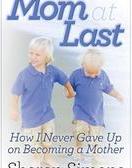Physically, having a baby is rarely easy, but trying to adopt a child requires more patience, determination, strength of will and faith than giving birth ever could.
Over the last seventeen years I have given birth to four children; the first, natural; the second, induced; the third, a near-fatal emergency C-section; and the fourth a planned C-section. Whatever the circumstances, it did not take long for life to return to normal and for the whole nine-month experience to become a quickly-fading memory.

Our youngest daughter Grace we brought home from China just over a year ago. As quickly as one forgets the woes of giving birth, the trials and tribulations of adopting are also forgotten, but as we prepare for our next and final adoption, I’m reminded of the struggles adoptive parents face.
Adopting, in Canada, requires one to complete a home study conducted by a provincially recognized Adoption Practitioner, and attend a course called P.R.I.D.E. (Parent Resources for Information, Development and Education)
In my mind I had equated PRIDE training to that of pre-natal classes and found the thought of spending three full days in a room full of first-time parents-in-waiting, taught by someone who probably wasn’t a parent but rather “an expert” and debating the “family bed” issue, or “how best to discipline children”, equivalent to nails down a chalkboard. I was less than enthused. However, my husband and I decided to turn it into a mini-holiday. We booked ourselves into a beautiful hotel and planned to spend the evenings soothing away the day’s annoyances with a good bottle of wine and some much needed alone time.
With our arrogance rightly squashed we discovered that PRIDE training was not at all what we envisioned, and we were not the resident experts. The course covered the adoption process itself, best ways to attach to your child, the grieving process that each child goes through, child development, placement challenges, and many other parenting issues that are unique to adoption. Rather than spending our evenings lamenting the hours lost that day, we enjoyed wonderful thought-provoking conversations not only about our family, but also how as police officers, we could use this information to better understand the challenges that some of the children we meet during the course of our duties, face daily. It was humbling, enlightening and maybe even a little bit frightening. I was beginning to feel like a first time mum, after all.
The home study loomed next. I worried about having my private life and my belief system examined by a stranger who professed to know best because he or she was a “social worker” with experience in the adoption world. I fretted that our home wouldn’t measure up, or that our children would have an “out-of-the-mouths-of-babes moment”, or that we would be denied because I was still using hand-me-downs that were surely outlawed many years ago by the “safety Nazis”. None of those fears came to fruition. Our Adoption Practitioner was a complete delight and we looked forward to her visits. With her, however, came the mountain of documents required to proceed, at which point the process became an exercise in frustration.
There is a requirement for international adoption to prove that one of the parents is Canadian. Photocopied birth certificates and other documents have to be notarized and sent off for authentication, which incredulously averages twenty-seven weeks to complete. Add to that, police checks, vulnerable sector checks, financial checks, fingerprints, medicals, salary letters, and a myriad of other required documents and the task becomes more and more daunting.
It took almost a year to get ready for the actual adoption, and then the wait began for a match. We were more fortunate than many. We sailed through the process, but make no mistake. Preparing for adoption is hard work and parents need to be very dedicated and very sure or they would throw their hands up and abandon the entire process. But even more than the red tape involved, adoption brings with it a lot of concerns and unknowns.
Before adopting Grace, I worried that I wouldn’t love her as much as I did our other four. More than this, I worried that she would in some way sense it. I asked my sister, an adoptive mom of 8 years, and she assured me there was no difference, but still my concern lingered. Looking back, although I knew intellectually that I loved my biological children as soon as they were born, emotionally I wasn’t really on the hook yet. Had my third child died of the sudden severe abruption, I would have grieved, of course, but true bonding doesn’t happen immediately. It happens over time and continues to grow each and every day. Having lost my eldest child in her teens, I know this to be true.
Admittedly, I never suffered the loss of a miscarriage, or years of failed IVF treatments, or had to come to terms with my own inability to conceive, but I know one thing that some people may wonder about. In the end, it doesn’t matter what brings one to adoption. I can say, unequivocally, that my husband and I love Grace as deeply and profoundly as we do our other children, and that she is also loved and accepted by all of them.
Now we can’t wait to bring home the next one, this time without the worries of first-time adoptive parents.
Article Source: http://EzineArticles.com/?expert=Patricia_Hung

